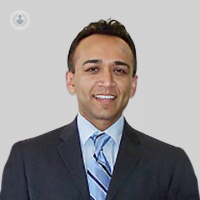Expert insight: Hormonal replacement therapy for menopause
Written in association with:Hormonal replacement therapy (HRT) can be used to resolve some of the more troublesome symptoms of the menopause and can therefore help to improve women’s quality of life as they go through this period of change. In this informative article, revered consultant in diabetes and endocrinology Dr Masud Haq shares his expert insight on the advantages of HRT and associated safety concerns. The highly respected specialist additionally details how treatment of this type can be administered and how its effectiveness may be reviewed throughout a course of treatment.

What are the advantages of hormonal replacement therapy for menopause?
Hormone replacement therapy (HRT) can help reduce the classical symptoms of hot flushes and night sweats associated with menopause. Other benefits include an improvement in energy, mood, ‘brain fog’, sex drive (also referred to as libido), concentration levels, sleep and overall quality of life. Vaginal dryness and urinary symptoms can also improve.
Long-term benefits include an improvement in bone health and a reduction in osteoporosis and fracture risk. If prescribed before the age of sixty, or within ten years of the menopause, there is a reduction in the risk of heart disease.
How safe is hormonal replacement therapy for menopause? Are there any side effects?
There should be a holistic approach when managing patients as lifestyle changes can be very helpful. If HRT is considered, it is generally safe and effective for the majority of women. Treatment should always be tailored to the individual accounting for the woman’s age, medical history and preference.
The risk of breast cancer with combined HRT (oestrogen and progesterone) is very low, particularly when compared to lifestyle risk factors such as alcohol intake and obesity. There is a very small risk of venous thrombosis (blood clots) or stroke but this occurs with oral oestrogen. These risks can be avoided by using transdermal preparations.
Who is an ideal candidate for hormonal replacement therapy for menopause?
Most women over forty-five with menopausal symptoms can be offered HRT. They should be provided with information and seek help to discuss the benefits of treatment.
Women with possible premature ovarian insufficiency (POI) should have a FSH (follicle stimulating hormone) blood test on at least two occasions and if elevated, they should seek a specialist opinion. Women with early menopause (from the age of forty to forty-five) should also be offered HRT after receiving advice and support.
How is HRT administered?
There are many HRT preparations but they all contain oestrogen. Some preparations are combined with progestogens. Oestrogen is available as a tablet, gel, patch or spray. Transdermal oestrogen is preferred as it’s considered safer.
Progestogens are available as micronised progesterone which is plant derived and ‘bioidentical’ to the natural progesterone produced by the ovaries. The alternative is synthetic progesterone which is available as a tablet, patch or intrauterine progestogen releasing system (IUS). Low dose testosterone replacement can be considered in some women and can help improve libido but is also likely to help energy levels and mood.
How long is a typical course of HRT?
Whereas in the past, women would have only received HRT for two to five years or until age sixty, there is no set time limit for the duration of HRT.
As every patient is different, the length of treatment should be assessed by weighing up the benefits and risks. A treatment “holiday” can be considered to determine whether symptoms have resolved. After initiating HRT, patients are typically reviewed after three months and then annually.
If you think you could benefit from treatment with HRT and wish to schedule a consultation with Dr Haq, you can do so by visiting his Top Doctors profile.


